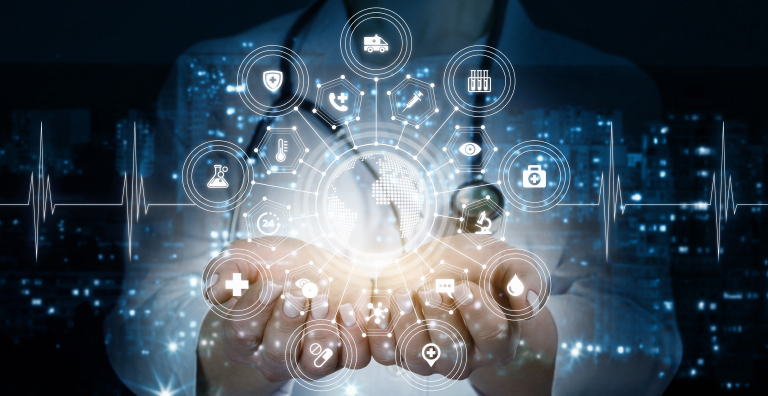Hospital Future Act (KHZG) & Biometric Authentication
To modernize its healthcare system, the German government (with funding contributed by individual states) is offering German healthcare facilities up to €4.3 Billion in funding for digitalization projects. The Hospital Future Act (KHZG) is driving the initiative, while the Hospital Future Fund (KHZF) from the Federal Social Security Office (BAS) plays a supporting role. These funds will be available to both large hospital consortiums or hospital chains as well as smaller hospitals to update emergency facilities, digitize their records and procedures and beef up IT security.
Why Now?
Like most countries, the German healthcare system is lacking modern technology upgrades that would improve the care of patients and make processes and workflow more efficient for clinicians. Many of the proposed digital initiatives will replace the human labor that is required to maintain outdated systems. Organizations will have the opportunity to be more efficient with less resources, doctors and nurses will be able to spend more time with patients and the care facility will benefit from fewer data breaches.
What Does the Act Cover?
There are 11 categories of projects that the Act will address but basically, it reimburses modernization of patient portals, electronic documentation, digital medication management, IT security measures and cross-sector telemedical network structures. The funding can also be used to introduce or improve telemedicine, robotics and high-tech medicine. However, the funding will only be re-imbursed for several of the categories if the solutions have the following characteristics:
- Solutions use an internationally recognized standard to create interoperability for digital services
- Solutions consider the requirements for the integration of open and standardized interfaces in accordance with Section 291d SGB V
- Solutions transfer documents generated for patients to electronic patient files
- Solutions consistently consider the measures to ensure information security according to the current state of the art
- Solutions comply with all data protection regulations
- Solutions incorporate telematics applications, where appropriate
Note that at least 15% of requested financing must be used to enhance IT security.
Benefits
Commonly, healthcare facilities see 100 or more employees sharing the same desktop and using multiple passwords to sign in and out of applications and systems. Not only is this time consuming and cumbersome for the clinician, but it also creates a security lapse as employees share passwords to save time and creates a burden (and associated cost) on IT help desk resources. Equipping a hospital with the latest technology will allow them to stop sharing passwords, as each clinician will have their own secure identity authentication that can be utilized regardless of the type of equipment, physical access policies or digital access to a myriad of healthcare applications.
Also, when it comes to patient well-being, sharing is important. With digital improvements and technology funded by the government, each hospital will have the ability to share best practices and data (think x-rays, drug history, previous prognosis, blood work, allergies, etc.) with other hospitals. Organizations can share e-Reports about patients and e-Receipts/prescriptions for controlled substances, lessening the chance of overdose, misdiagnosis and the administration of contradictory or unnecessary care or medications.
How Can Biometric Technology Help to Meet the 15% IT Security Requirement?
Besides the benefit of doing away with multiple passwords, that can be lost or stolen, biometric authentication and verification constitute a digital signature. Previously, a doctor had to be onsite to approve medicine. They will now have the ability to approve remotely, saving time and avoiding accidental patient overdose.
Some other benefits (and sources of cost savings/increased revenue) of biometric fingerprint technology include the ability to:
- Streamline clinician processes by requiring only single-sign-on with a digital fingerprint — saving up to 45 minutes per day over passwords
- Prevent costly litigation and maintain full regulatory compliance by accurately verifying clinician identity
- Mitigate 90% of lost/stolen identification and password-related help-desk calls
- Provide secured, one-touch access for shared workstations, cutting down on the bottleneck of multiple clinicians logging in and out of one system multiple times daily
- Integrate easily with any healthcare-provider’s software (plug and play)
- Prevent prescription drug theft
The Deadline Approaches
Hospitals and clinical care facilities have until December 31, 2021 to file their application. The digitization status of each applicant hospital will be evaluated in June 2021 and 2023.
For more information about biometric technology for streamlining hospital operations watch A Day in the Life - Secure Access and Authentication in Healthcare, or see the infographic Europe’s Problem with Passwords in Healthcare.
Marcel has over twenty years of experience in sales of complex IT security solutions in tagging systems, CCTV, physical access control with biometric and RFID solutions. Prior to joining HID Global, he has held several management positions at Honeywell and Tyco and NineSigma. Zillig holds a bachelor’s degree in Economics and Law from the University of Duisburg-Essen.
